|
|
|
Sort Order |
|
|
|
Items / Page
|
|
|
|
|
|
|
| Srl | Item |
| 1 |
ID:
157120
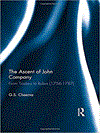

|
|
|
|
|
| Publication |
New Delhi, Manohar Publishers and Distributors, 2017.
|
| Description |
368p.hbk
|
| Standard Number |
9789350981528
|
|
|
|
|
|
|
|
|
|
|
|
Copies: C:1/I:0,R:0,Q:0
Circulation
| Accession# | Call# | Current Location | Status | Policy | Location |
| 059282 | 954.03/CHE 059282 | Main | On Shelf | General | |
|
|
|
|
| 2 |
ID:
169171
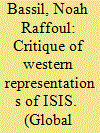

|
|
|
|
|
| Summary/Abstract |
The meteoric rise of the group calling itself the Islamic State of Iraq and al-Shams (ISIS) has been accompanied by an equally stunning effort to explain from where the organisation emerged, what it is, and why people have been attracted to it. What this article identities, is that despite what appears to be a veneer of intellectual heterogeneity, a deep Orientalism permeates knowledge production about ISIS. Adopting a hybrid-postcolonial lens, the analysis in this article demonstrates that due to a particular Eurocentric-Orientalist schema and disposition, ISIS and its horrendous crimes have been dehistoricised, depoliticised and decontextualised. Additionally, in the process ISIS has been reduced to the Muslim’s fundamentalist dispositions; its innate tendency to incorporate Islamic theological methods, medieval Islamic scholarship, Islamic culture into all forms of politics. Instead, we argue in conclusion, for ISIS to be understood there needs to be a re-reading of the emergence of Islamist violence and terror through a historicised, materialised and politicised methodological framework.
|
|
|
|
|
|
|
|
|
|
|
|
|
|
|
|
| 3 |
ID:
049897
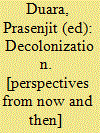

|
|
|
|
|
| Publication |
London, Routledge, 2004.
|
| Description |
xvi, 312p.
|
| Series |
Rewriting histories
|
| Standard Number |
0415248418
|
|
|
|
|
|
|
|
|
|
|
|
Copies: C:1/I:0,R:0,Q:0
Circulation
| Accession# | Call# | Current Location | Status | Policy | Location |
| 047353 | 325.3/Dua 047353 | Main | On Shelf | General | |
|
|
|
|
| 4 |
ID:
166763
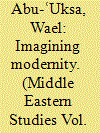

|
|
|
|
|
| Summary/Abstract |
This article employs the methodology of conceptual history to contest two of the most common theoretical approaches dominating our understanding of modernity in the field of Middle Eastern studies. The first approach relies on the assumption of incompatibility between modernity and Islam and captures Arab modernity using concepts such as ‘adoption’. The second understands Arab modernity through concepts such as ‘imitation’, contending that it is a legacy of Western imperialism. This article challenges both theories by examining the genealogy of tamaddun (civilization, being civilized), a pivotal concept used in nineteenth-century Arabic to imagine modernity. The genealogy of tamaddun elucidates that medieval paradigms derived from the concept of madina (polity) were rediscovered, reimagined, and reused in the context of the rise of the nation-state and the challenge of Western imperialism. The article suggests understanding Arab modernity and its critique from within, rather than outside of, the temporality of the historical condition.
|
|
|
|
|
|
|
|
|
|
|
|
|
|
|
|
| 5 |
ID:
185845
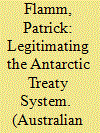

|
|
|
|
|
| Summary/Abstract |
Like other international institutions, the Antarctic Treaty System (ATS) relies on the goodwill and self-binding commitment of its members. Legitimacy, understood as the belief in the ‘rightfulness’ of a governing arrangement by its stakeholders, lies at the heart of the ATS’ success as a multilateral institution. Global warming and geopolitical power shifts are poised to challenge established forms of Antarctic legitimacy and effectiveness, with external calls for Antarctic democratisation and reform increasing. Using the concepts of input, output, and throughput legitimacy, this paper explores how the ATS has been legitimated as the only authoritative decision-making context for Antarctic matters, internally amongst Treaty Partners as well as externally towards the rest of the international community. It argues that the increase of input legitimacy through the inclusion of more consultative parties led to a perceived lack of output legitimacy for some especially environmental critics which illustrates the importance but also the limits of maintaining consensus about throughput legitimacy: the agreed upon processes and rules of decision-making. Finally, the analysis problematises the inhibiting centrality of nation states and the logic of sovereignty during times of global ecological and geopolitical change and asks how an ambitiously democratic future of Antarctic governance in the Anthropocene might look like.
|
|
|
|
|
|
|
|
|
|
|
|
|
|
|
|
| 6 |
ID:
125279


|
|
|
|
|
| Publication |
2013.
|
| Summary/Abstract |
The Western intellectual hegemony in the educational domain in Indonesia has been very obvious, especially in the establishment of the controversial international pilot project schools and school with international standard in Indonesia. This provides clear evidence that the hegemonic power of the colonizers at work, as it has been allowed to seep in to the country`s education system. This seeks to show that the Indonesian government`s efforts to internationalize the national education system cannot be separated from what is often referred to as the "discourse of globalization", manifested (in this case) primary through the fetish of English language education. It examines the current educational practice in Indonesia, which is situated in this discourse of globalization in the light of a post-colonial perspective. It also seeks to unravel the Western intellectual determinism formulated in the policy regarding the goal of SBI, which has sparked protracted debates among scholars and educational practitioners.
|
|
|
|
|
|
|
|
|
|
|
|
|
|
|
|
|
|
|
|
|